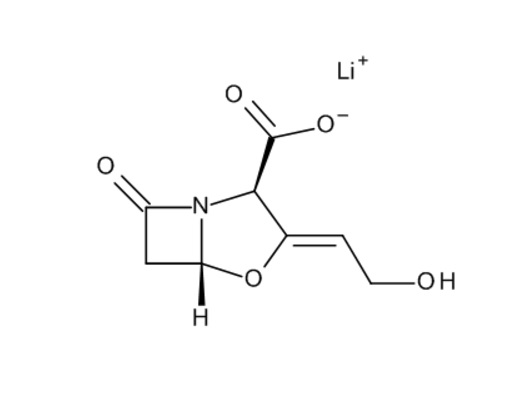Aminoxy-PEG3-Propargyl
- CAS NO.:1807537-27-4
- Empirical Formula: C9H17NO4
- Molecular Weight: 203.24
- MDL number: MFCD28950771
- Update Date: 2024-10-28 23:16:16

What is Aminoxy-PEG3-Propargyl?
Description
Aminooxy-PEG3-propargyl has a alkyne group and an aminooxy group. The aminooxy group reacts with aldehydes or ketones to form a stable oxime linkages. The alkyne group can participate in copper catalyzed azide-alkyne Click Chemistry reactions. Aminooxy compounds are very reactive and sensitive; they cannot be stored for long term. Immediate use (within 1 week) is highly recommended.
Properties of Aminoxy-PEG3-Propargyl
| Boiling point: | 309.6±32.0 °C(Predicted) |
| Density | 1.069±0.06 g/cm3(Predicted) |
| pka | 4.21±0.70(Predicted) |
| form | Liquid |
| color | Colorless to light yellow |
Safety information for Aminoxy-PEG3-Propargyl
Computed Descriptors for Aminoxy-PEG3-Propargyl
New Products
4-AMINO-TETRAHYDRO-PYRAN-4-CARBOXYLIC ACID HCL 4-(Dimethylamino)tetrahydro-2H-pyran-4-carbonitrile 4-Aminotetrahydropyran-4-carbonitrile Hydrochloride (R)-3-Aminobutanenitrile Hydrochloride 3-((Dimethylamino)methyl)-5-methylhexan-2-one oxalate 1,4-Dioxa-8-azaspiro[4.5]decane 5-Bromo-2-nitropyridine Nimesulide BP Aceclofenac IP/BP/EP Diclofenac Sodium IP/BP/EP/USP Mefenamic Acid IP/BP/EP/USP Ornidazole IP Diclofenac Potassium THOMAIND PAPER PH 2.0 TO 4.5 1 BOX BUFFER CAPSULE PH 9.2 - 10 CAP SODIUM CHLORIDE 0.1N CVS ALLOXAN MONOHYDRATE 98% PLATINUM 0.5% ON 3 MM ALUMINA PELLETS (TYPE 73) LITHIUM AAS SOLUTION 2-Bromo-1-(bromomethyl)-3-chloro-5-nitrobenzene 2-Bromo-3-nitroaniline N-(3-Hydroxypropyl)-N-methylacetamide 3-Bromo-6-chloropyridazine 4-ethyl-3-nitrobenzoic acidRelated products of tetrahydrofuran








You may like
-
 Aminoxy-peg3-propargyl 95% CAS 1807537-27-4View Details
Aminoxy-peg3-propargyl 95% CAS 1807537-27-4View Details
1807537-27-4 -
 1-Methyl-6-oxo-1,6-dihydropyridazine-3-carbonitrile 98%View Details
1-Methyl-6-oxo-1,6-dihydropyridazine-3-carbonitrile 98%View Details
99903-60-3 -
 1823368-42-8 98%View Details
1823368-42-8 98%View Details
1823368-42-8 -
 2-(3-(tert-butyl)phenoxy)-2-methylpropanoic acid 1307449-08-6 98%View Details
2-(3-(tert-butyl)phenoxy)-2-methylpropanoic acid 1307449-08-6 98%View Details
1307449-08-6 -
 Ethyl 3-(furan-2-yl)-3-hydroxypropanoate 25408-95-1 98%View Details
Ethyl 3-(furan-2-yl)-3-hydroxypropanoate 25408-95-1 98%View Details
25408-95-1 -
 2-Chloro-5-fluoro-1-methoxy-3-methylbenzene 98%View Details
2-Chloro-5-fluoro-1-methoxy-3-methylbenzene 98%View Details
1805639-70-6 -
 1784294-80-9 98%View Details
1784294-80-9 98%View Details
1784294-80-9 -
 Lithium ClavulanateView Details
Lithium ClavulanateView Details
61177-44-4
Statement: All products displayed on this website are only used for non medical purposes such as industrial applications or scientific research, and cannot be used for clinical diagnosis or treatment of humans or animals. They are not medicinal or edible.